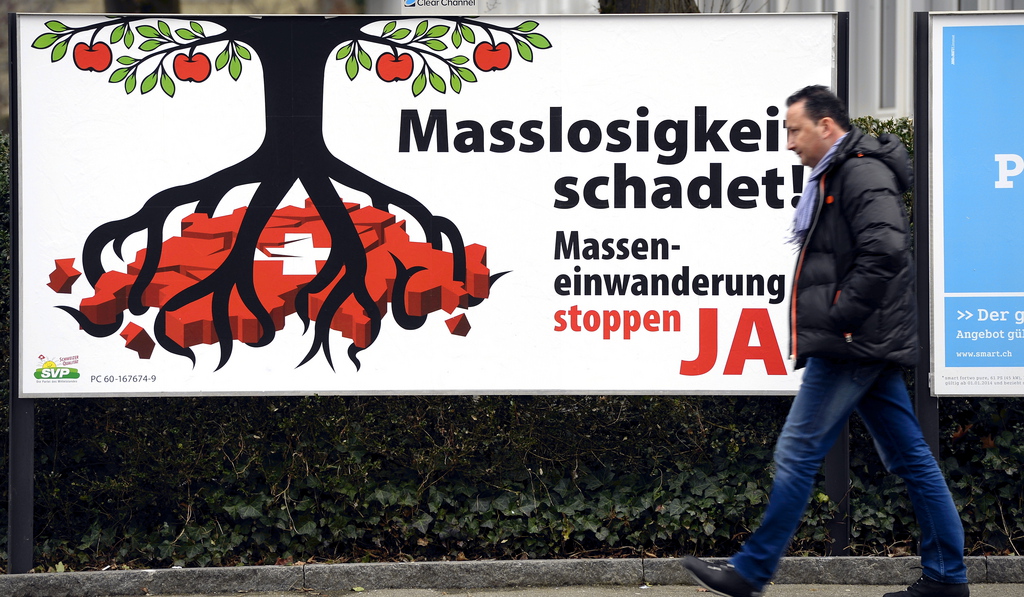
Businesses fear anti-immigration vote fallout

The recent vote to restrict the inflow of European Union workers is having effects on Swiss businesses according to a survey, with less confidence in investment and concerns that growth prospects for the economy have worsened.
The results of a poll of 8,000 participants across 2,700 firms released by the KOF Swiss Economic Institute on Friday found that 2.6% of companies were going to cut down on investments this year, a figure that could rise to almost 6% by next year and perhaps edge even higher afterwards. Only 0.9% of those polled want to increase investment (1.8% in 2015).
Almost 32% are expecting increases in the costs of staff recruitment. Until now though only relatively few firms have changed their staff planning for the current year.
In terms of recruitment planning, “answers likewise point to a slightly chilling trend”, noted KOF. In 2015, 7% of companies state they will follow a more restrained staff policy, and from 2016 this rises to 9%. Between 2% and 3% say they will hire more staff.
Firms with a higher proportion of foreign employees will be more likely to reduce investment and to hire fewer staff than previously planned, KOF found. In addition, reduced planning security and a more sceptical view of growth prospects tended to have an unfavourable effect on investment and staff planning.
Mid-term growth prospects were also a concern. “Around one half (49%) of businesses consider that the growth dynamic for the Swiss economy will be slowed due to the initiative’s success. Firms in the construction sector are more likely to be considering reductions in investment and employment than firms in the industrial or services sectors,” concluded KOF’s experts.
Uncertainty
On Friday, the president of the Swiss National Bank, Thomas Jordan, commenting on Swiss monetary policy, also called the acceptance of the anti-immigration initiative, “an additional uncertainty factor for the economy”.
He said it was unclear how the initiative was going to be put into effect and what the fallout would be for EU relations, according to the Swiss news agency. For the moment it had not been factored in to the bank’s economy outlook, which stays at around 2% growth for 2014.
The KOF report is not the first survey to point to problems after February 9: earlier this month bank UBS found that half of the 400 firms they polled predicted problems for meeting their employment requirements, while a report by consultants Deloitte said that a large majority of chief financial officers were unnerved about the vote fallout.
The government has three years to come up with a way of implementing February’s immigration vote to cap “mass immigration” from the EU, a decision which has caused controversy both within and outside Switzerland, with Brussels in particular signalling its displeasure.
Trade unions and economists have already warned that thousands of jobs could be lost, whereas the rightwing Swiss People’s Party, which had backed the immigration vote, has consistently downplayed such comments as scaremongering.
On February 9, Swiss voters narrowly voted in favour (50.3%) of an initiative to limit immigration. The move by the Swiss People’s Party – known for its anti-foreigner and anti-EU agenda – calls for a reintroduction of quotas, as well as a national preference when filling job vacancies and restrictions of immigrants’ rights to social benefits.
Critically, it also stipulates that Switzerland will have to renegotiate its bilateral accord with the EU on the free movement of people within three years or revoke it. This in turn could threaten other bilateral agreements with the EU.
The Swiss government plans to draw up a draft law to limit immigration by the end of the year. It will also draw up an implementation plan by the end of June and hold exploratory talks with the 28-member EU over the future of the free movement of people and other bilateral agreements.
Free movement of people and jobs within the borders of member states is one of the fundamental policies of the EU, and Switzerland, while not a member, has participated under a pact with Brussels. The bilateral accord on the free movement of persons entered into force in 2002. The eastern European countries who joined the EU later were included in the accord from 2011, and restrictions to the Swiss job market on workers from more recent members – Bulgaria and Romania – will remain until 2016. A solution for Croatia – the newest member – is being discussed.

In compliance with the JTI standards
More: SWI swissinfo.ch certified by the Journalism Trust Initiative



























You can find an overview of ongoing debates with our journalists here . Please join us!
If you want to start a conversation about a topic raised in this article or want to report factual errors, email us at english@swissinfo.ch.